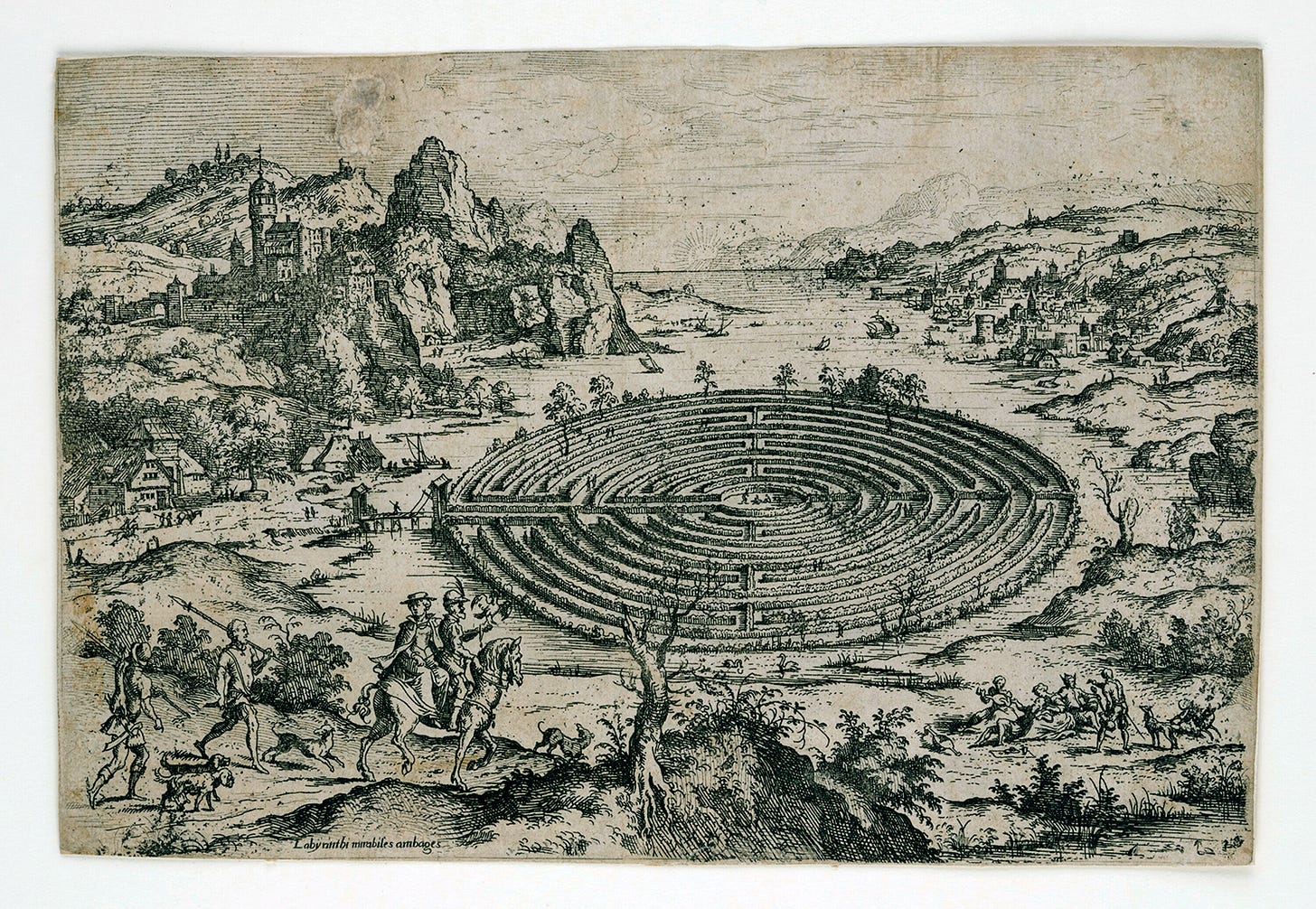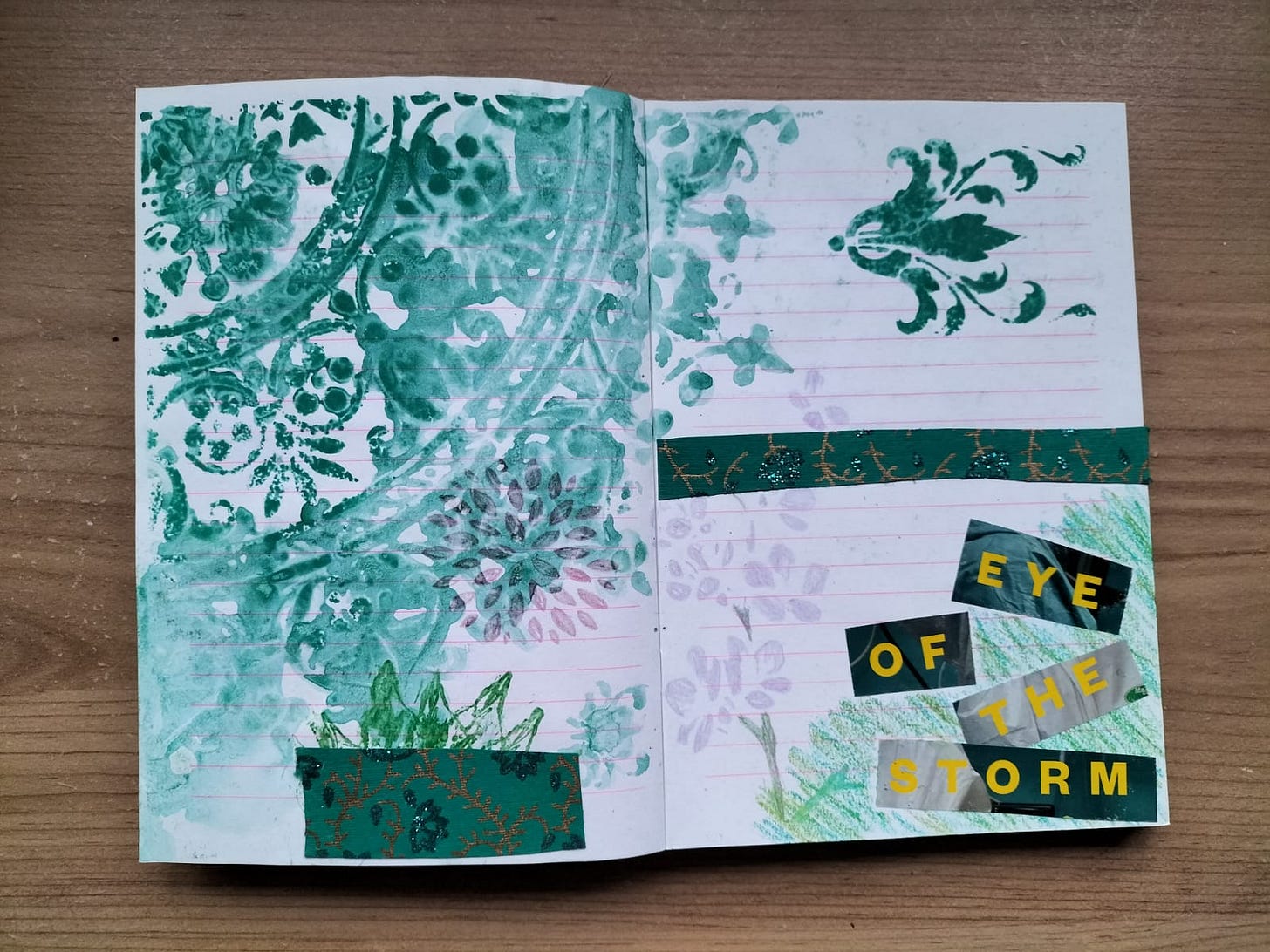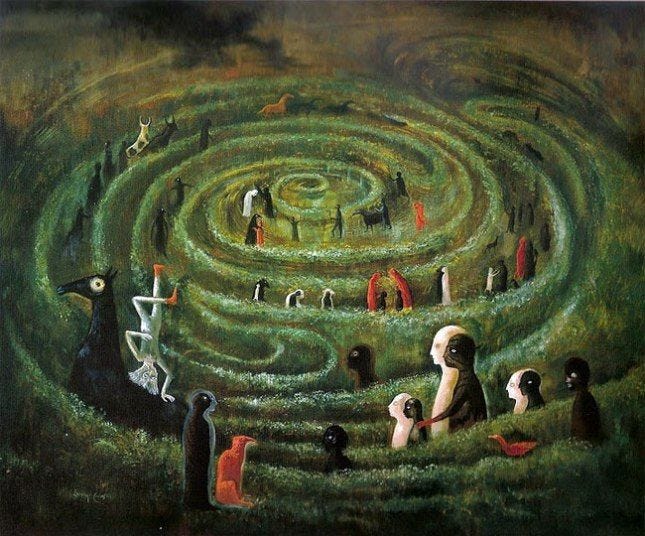“I think this is actually quite a complex case and there are some people making it out to be much more simple than it actually is…” - Leo Varadkar, Irish Taoiseach
What happens when we resist calling things what they are?
What harm do we perpetuate when we attempt to keep moving through a situation without acknowledging the governing truth of it?
I have realised that when I write, I write a lot of questions. And usually, I write these questions without any expectation that I will be able to answer them immediately. But maybe that’s what writing is about; uncovering good questions. Maybe life will always be about moving from question to question. Maybe an answer is not a good answer unless it leads to another question.
Questions are like doorways. The other night I dreamt that I was crawling through dark tunnels, so dark that I had no way of knowing what danger might be moving silently towards me, roots and brambles weaving their way around my path, searching for a thread of light to follow. I imagine myself now back in that labyrinth of tunnels, persevering until I find my way into an opening, a pentagonal room with doors on every wall. Each door a question.
Which door should I open, which question’s path should I give myself to? And what informs my choice? Do my questions spring from the bottom of the well, or have I constructed a protective sheath somewhere on my race up towards light, a landing pad of sorts, to prevent me from becoming entangled in the algal truths that lurk in the depths of the water?
Wells, tunnels, labyrinths. Does any of this make any sense? I feel I have run out of words for what is happening in our world. And yet here I am, trying to write about why words matter, trying to find my way through the labyrinth of my own mind to emerge with something useful.
I first came across the concept of noa-names when I was researching Irish folklore in search of stories of Brigid for my song cycle In Cloak & Womb. A noa-name is an alternative name given to something taboo or dangerous for fear that speaking its real name might summon it. In his book The Festival of Brigit (which I happened upon a copy of in Oxfam Books early on in my deep dive), Séamus O’Cathain writes about how people avoided calling wolves by that name, for fear of drawing them in. One of the noa-names given to the wolf was olc, meaning evil. In Sweden, instead of calling the wolf by their proper name ulv, people might refer to them as varg, meaning stranger. The surviving name for the wolf in the Irish language is Mac Tíre, meaning Son of the Land. Which sounds quite romantic, to be fair. I think our imaginative relationship with wolves in Ireland has been reshaped by the role colonisation played in their destruction.
This idea that calling something by its true name might cause it to appear rears its head in fantasy fiction too, probably on more occasions than I realise due to my limited knowledge of the genre. Lord Voldemort must be referred to as You-Know-Who or He Who Must Not Be Named, as speaking his name might conjure him into being. In Robert Jordan’s series The Wheel of Time, Shai’tan is referred to as The Dark One for fear that simply uttering his name will bring misfortune and empower him to break the spirit of whoever he comes into contact with.
I wonder too whether we believe on some unconscious level that, by dancing around the names of things, we can not only protect ourselves from potential future occurrences but stave off that which has already happened? I am thinking of death. When someone dies they are not dead but passed on, slipped away, gone over. Crossed the rainbow bridge. If we say “she’s dead”, does that somehow make reality itself more real, more final, more irreversible, than if we use one of these gentle alternatives?
I once facilitated a workshop on creativity as a tool for exploring loss alongside a brilliant woman who had no patience for these alternatives. We must learn to stop hiding away from words like death, we must stop trying to make our grief more palatable for others, she would say, pulling people up if she felt they were tiptoeing around it. It was an important point of view (though I think we often need the gentler alternatives to build ourselves up to accepting the finality of it, and in that particular scenario my own feeling was that if someone had plucked up the courage to come to the workshop in the first place they were welcome to use whatever language they needed to if it enabled them to express anything at all on the subject) and while I hear the logic in rhetorics like ‘actions speak louder than words’, I can’t help but sense that a rise in fearlessly unapologetic language might carry with it with a rise in fearlessly compassionate action.
A willingness to ask compassionate questions.
In a story from the legend of the Holy Grail, the knight Perceval is out on a quest when he comes across a banquet. In the middle of it all sits a king who is in great pain. The king is under a spell which means that his wound, a groin injury, will not heal unless someone asks him a compassionate question. And yet everyone is too afraid, too polite, to bring it up, and so the king suffers for many years. Eventually, so consumed by the guilt of knowing that he could have helped simply by showing compassion, Perceval returns and asks: “My lord, what aileth thee?”. The king begins to heal thanks to this invitation to speak his pain.
And so, what noa-name do we give to genocide? War? Conflict? Or simply, complicated?
And what harm, what violence, do we perpetuate when we refuse to call it what it is?
As I write this, news arrives that the ICJ has ruled that allegations made against Israel fall under the provisions of the Genocide Convention and ordered an end to all genocidal acts. This is nothing many people didn’t already know and haven’t been crying out for, but it’s a validation of sorts. It remains to be seen whether Israel or indeed The USA they will face meaningful consequences if (when) they don’t respect the ruling, but the unequivocal use of the WORD so many have been avoiding should force the rest of the world to step up to its obligations.
I used to be afraid of WORDS.
I used to be afraid of words like -
anxiety.
I remember a morning when, in the throes of sickening anxiety, I rose early and my attention was drawn to the kitchen table where I’d discarded a pamphlet received during a facilitator training session with Mental Health Ireland (ha!). I leafed through it and baulked at the large letters spelling out anxiety. Nope, not me. The very word made me nauseous. In fact, I wrote about that very thing in this song:
I’m scared to be weak
And just the other day
I read a pamphlet about mental health
But I thought it was meant for someone else
Soon afterwards, on my first visit to a therapist, I was given the option of filling in a questionnaire ahead of time. I was grateful because, if you hadn’t guessed, I’m more comfortable with writing than talking, and it would probably have taken me months to say what I wrote on the page. During that first session, she leafed through my answers, looked up at me and said: “This is pretty high level anxiety.” An unexpected surge of relief! The clouds parted and the beast I had been so afraid to name showed its face. Rather than giving it the power to completely consume me, the act of yielding to the reality of its existence put something back into my hands (I can’t find a word for the something). I had a label, a ticket, a direction, something I could own, something I could work with.
What harm do we perpetuate against ourselves, in what ways do we block ourselves off from the best path of action, by denying ourselves the right words?
I used to be afraid of words like -
insomnia.
I’m not an insomniac! I just…don’t sleep very well, quite often. Don’t name the beast, or you might become the beast. Don’t admit defeat.
In Sleepless, Maria Darrieussecq asks:
“Where does insomnia come from? From ghosts? From the brain? From a troubled soul? From the world?”
As I linger in what Darrieussecq calls a ‘piteous state of intense generalised wakefulness’ I wonder what it might mean to sleep soundly in a time like this? In a time when the leader of a country can refer to another population as ‘human animals’ while the leaders of other countries fall over themselves trying to avoid naming the beast?
Human animals.
And maybe therein lies one of the great thought errors of our species. We think we are not animals. We think we can make some lives less valuable than others by dehumanising them, by animalising them.
“There are some people who can live without wild things, and some who cannot,” Darrieussecq quotes from A Sand County Almanac, before adding: “Those who cannot live without wild animals lose sleep as the massacre continues. Their sleep unravels. It is populated with ghosts.”
Those who cannot live without wild things know that we ourselves, through the anthropocene we have been born into, are too easily divorced from our own wild wisdom. We cannot sleep while our fellow human animals perpetuate damage to this beautiful earth and all of our other animal kin who share it with us. And we cannot sleep while our fellow humans are massacred.
“The difference is not so much between us and animals as between the ‘killable’ and the ‘non-killable’, as Donna J. Harraway pointed out. And in order to make humans killable, all you have to do is animalize them. Human massacres are permitted by animal massacres.” - Marie Darrieussecq
I think about wolves again. In Ireland there have been many conversations about reintroducing these sons and daughters of the land, because their extermination wreaked havoc on biodiversity. They help keep things in balance. These conversations are often shut down by the argument that this is ridiculous, because of the threat they might pose to humans. As if forests and wild places exist solely for humans to enjoy them passively, unimpeded. As if biodiversity loss is not more detrimental to our entire species than the presence of wolves.
It is said that on the Trobriand islands there is a single word - Mokita - which translates as ‘the truth we all know but refuse to talk about.’
Noa-names can sometimes be thought of as euphemisms, too. A way to avoid offence. To play something down. To gaslight - think Micheál Martin reducing Richard Boyd Barrett’s tireless activism for Palestine to ‘a performance’. In this case I don’t think it can be said that the refusal to use the word genocide comes from a place of being scared of bringing it into being. Anyone in their right minds knows it’s too late for that. It comes from a place of worrying about the consequences of using it - to use it is to bring about a responsibility to act differently. To act at all.
So please, no more noa-names for genocide.
No more allowing the massacre of beautiful, life-deserving humans (and the land they live on and all the beings they share it with) to continue by refusing to speak the truth of the matter.
We must dive right down to the bottom of the well, through the labyrinth of beliefs that protect us from having to reimagine our place in the world, in order to emerge with the questions that will genuinely help us to dismantle that which might otherwise destroy us.
We must live our questions,
our questions must live through us.
We must:
“Do away with nostalgia for the future, the famous future of ‘progress’ that gleamed in my childhood, with its senseless promise of growth. Change the image of the future, even a tiny bit, shift ourselves ever so little, a small sidestep - that’s what literature is for. An enormous ambition, and yet a modest one - in order to wake up slightly different.” - Marie Darrieussecq
We must name the beasts -
the beasts within and the beasts without -
(because they are not unrelated)
and then what?
What are the words, the questions, that will wake us up?
And wake us up differently?







I absolutely love this! I have noticed a huge surge in people talking about language from many fascinating perspectives in the past 10 days... I don't know much about astrology but I know that Pluto entering Aquarius is set to transform concepts of personal power and technology. It seems that we are all looking inwards at the intentionality and power of one of our first evolutionary technologies, speech! From prayers to spells to incantations.. even the act of handing down SENTENCES of life and death! It feels like we're remembering why it is that we speak. Thank you for teaching me about noa-names. I'm curious about the etymology of the noa bit now ❓ ❤️